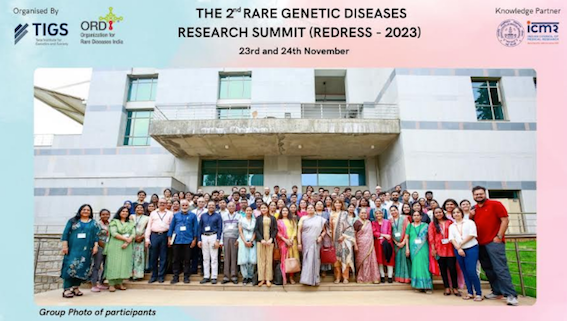Rare Genetic Diseases Research Summit (REDRESS) 2023: Unveiling the Power of Multi Stakeholder Engagement
February 28, 2024 | Wednesday | Features | By Saveetha Meganathan and Surabhi Srivastava
Uniting stakeholders to accelerate diagnostic and therapeutic solutions for rare genetic diseases
In the complex realm of rare genetic diseases (RGDs), millions in India navigate a terrain of hardship and isolation. The Rare Genetic Diseases Research Summit (REDRESS) 2023 hosted by the Tata Institute for Genetics and Society (TIGS) and the Organization for Rare Diseases India (ORDI), along with the Indian Council for Medical Research (ICMR) as our knowledge partner, was our second national summit. This unique platform serves as a powerful catalyst for a multi-pronged approach in uniting stakeholders to accelerate diagnostic and therapeutic solutions for RGDs in India using cutting edge science and technology.
Building upon the success of its inaugural year, REDRESS 2023, held on November 23rd and 24th, aimed for even greater impact. Over 50 diverse voices resonated throughout the summit, echoing from the halls of government ministries to the labs of groundbreaking researchers. Dignitaries, renowned clinicians, passionate patient advocates, and innovative industry pioneers joined forces with dedicated basic scientists and promising start-up representatives.
The collective focus traversed the RGD spectrum, delving into the intricacies of basic research, cutting-edge MedTech advancements, and the complexities of running clinical trials and navigating regulatory policies. REDRESS 2023 spotlighted the vital roles of diagnostics, policy research, and industry investment in propelling progress forward developing cost-effective therapeutics.
The opening session set the stage, with powerful voices leading the charge. Dr. Rakesh Mishra, Director of TIGS championed the vital need for a homegrown approach, emphasizing the importance of societal acceptance in tackling RGDs and the need to bring our collective resources and expertise to the table. Mr. Prasanna Shirol of ORDI, speaking from the heart, painted a poignant picture of the hope and challenges faced by RGD patients and their families. He highlighted how this hope is now moving towards a strong research focus, coupled with policy advocacy for acceptance.
Dr BS Charan, representing the government, acknowledged the struggles faced by the community while showcasing concrete steps, such as the National Policy for Rare Diseases and the expansion of Centres of Excellence, to address these challenges head-on. He highlighted several steps to improve access and bring these patients closer to available solutions.
However, REDRESS 2023 did not merely preach from a podium. The agenda vibrated with the pulse of collaboration. Researchers exchanged crucial insights across various RGDs, forging bonds that promise to bridge research gaps and accelerate the development of life-changing diagnostics and treatments. The need for policy reforms, ensuring easier access to healthcare and research opportunities for patients, resonated throughout the halls, finding passionate advocates in patient groups and policymakers alike. Empowering patients to participate in research and decision-making processes was another key theme, recognizing their indispensable role in shaping the future of RGD research.
The impact of REDRESS transcends the confines of the two-day event. The discussions, collaborations, and action points set in motion the pathways to accelerate solutions in the RGD field. With each REDRESS summit, the hope flickers brighter, promising a future where rare diseases are no longer rare in terms of attention, resources, and, most importantly, hope.
Saveetha Meganathan and Surabhi Srivastava
Click here to read the next article on REDRESS 2023









